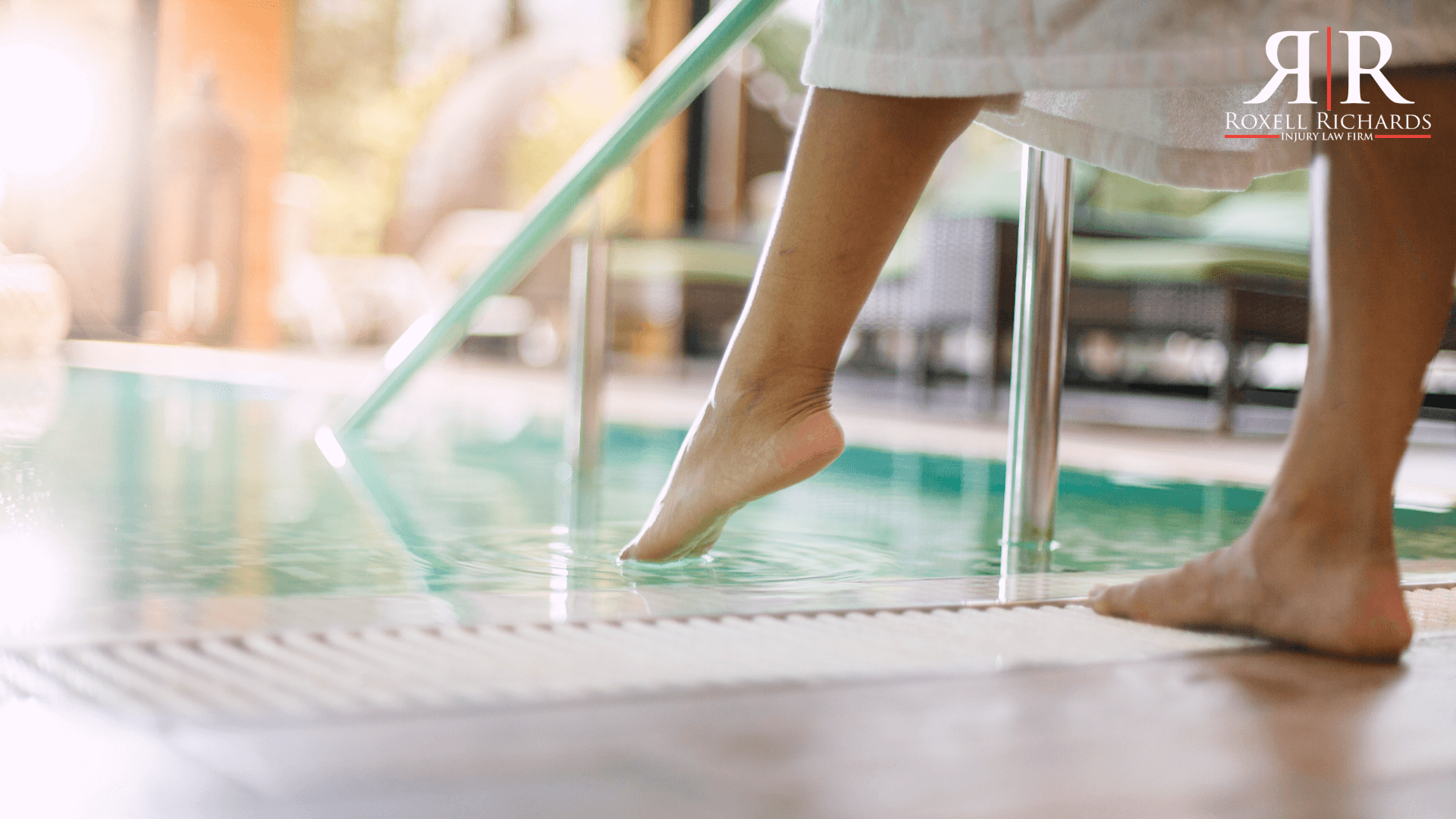Legal Challenges in Swimming Pool Accidents
Swimming pools are wonderful places to have fun and beat the summer heat. However, accidents can happen, and it’s important to be aware of the legal challenges that can arise from such incidents.
This blog will explore the common accidents in swimming pools and the responsibilities of resorts with swimming pools in Texas. And this also includes liability issues, the importance of rules and regulations, and the concept of negligence in the hospitality industry.
Accidents that can occur in a swimming pool
Swimming pools are popular places for leisure and recreation, but it’s important to be aware of the potential accidents.
And here are some common accidents that may happen in a swimming pool:
- Slipping and Falling: Wet surfaces around the pool area can lead to slips and falls. And this emphasizes the need for slip-resistant flooring and proper drainage systems.
- Diving Accidents: Improper dives or diving into shallow water can cause severe head and spinal injuries. And this highlights the importance of clear signage and designated diving areas.
- Drowning: Lack of safety precautions can result in drowning accidents. Thus, necessitating trained lifeguards and water safety education, particularly for children.
Most Common Safety Problem You See At The Pool
Lack Of Proper Supervision
Insufficient or untrained lifeguards can result in delayed responses to emergencies or accidents, increasing the risk of injuries or drowning incidents.
So pools need to have an appropriate number of trained lifeguards present at all times. And this will ensure sufficient monitoring in the pool area and respond promptly in emergencies.
Poor water quality and hygiene
Inadequate maintenance, improper water treatment, and lack of cleanliness can lead to waterborne illnesses or infections. Therefore, it is crucial to ensure proper filtration, regular water testing, and adherence to hygiene practices.
Running on slippery surfaces
Many individuals, especially children, run around the pool area, leading to slips, falls, and swimming pool injuries.
Ignoring diving restrictions
Some people disregard designated diving areas or dive into shallow water, risking head, neck, or spinal injuries.
Lack of proper flotation devices
Not wearing appropriate flotation devices, such as life jackets, when required increases the risk of drowning, especially for non-swimmers or inexperienced swimmers.
Unsafe behaviour and horseplay
Engaging in rough play, pushing others into the water, or engaging in unsafe behavior can lead to accidents, injuries, or drowning death incidents. And an example of unsafe behavior is holding others underwater,
And to promote a safe public pool environment, addressing these common safety problems by implementing and enforcing pool rules. Also, providing adequate supervision, maintaining proper water treatment and hygiene. Furthermore, educate pool users about safety practices and ensure compliance with safety standards.
Responsibilities of a resort with a swimming pool in Texas
Resorts with swimming pools in Texas have specific responsibilities to ensure the safety of their guests.
- Ensuring Pool Safety: Resorts with swimming pools in Texas are primarily responsible for maintaining a safe pool environment for their guests. And this includes regularly inspecting the pool area, ensuring safety equipment is in place and functional, and promptly addressing potential hazards.
- Compliance with Regulations: Resorts must comply with local and state regulations governing swimming pool safety in Texas. Moreover, these regulations may include requirements for pool fencing, signage, lifeguard certification, water quality maintenance, and regular inspections.
- Proper Maintenance: Resorts are responsible for maintaining the pool facilities, including regular cleaning, water treatment, and ensuring the proper functioning of filtration and circulation systems. This helps prevent the growth of harmful bacteria and ensures a clean and healthy swimming environment.
- Adequate Lifeguard Coverage: Depending on the size and type of the pool, resorts may be required to provide adequate lifeguard coverage. Because lifeguards are responsible for monitoring pool activities, enforcing safety rules, and responding quickly in emergencies.
- Safety Education: Resorts should provide their guests with information and educational materials on pool safety. And this may include displaying clear signage with safety guidelines and offering swimming lessons or water safety programs. Furthermore, promoting awareness about potential risks and how to prevent accidents.
Responsibilities of a pool job
- Monitoring Pool Area: Pool staff, including lifeguards and attendants, are responsible for constantly monitoring the pool area to ensure the safety of swimmers. Therefore, they should be vigilant in observing and addressing potential hazards or unsafe behavior.
- Enforcing Safety Rules: Pool staff must enforce safety rules and regulations, such as diving restrictions, no-running policies, and ensuring proper use of flotation devices. Also, they should address violations and educate guests on the importance of following these rules.
- Responding to Emergencies: In an accident or emergency, pool staff should be trained to respond promptly and effectively. And this includes administering first aid, initiating rescue procedures, and contacting medical professionals or emergency services when necessary.
- Maintaining Cleanliness and Hygiene: Pool staff should ensure the cleanliness of the pool area. And this includes regularly skimming and removing debris, monitoring water quality, and maintaining proper chemical balances to prevent waterborne illnesses.
- Providing Excellent Customer Service: Pool staff should deliver excellent customer service by assisting guests with inquiries. And this is by providing information on pool safety and promptly and promptly addressing any concerns or complaints promptly and professionally.
And by fulfilling these responsibilities, resorts and pool staff contribute to creating a safe and enjoyable swimming experience for guests while minimizing the risk of accidents and injuries.
Hotels’ liability for a personal injury claim
Hotels can be held liable for personal injury claims resulting from accidents in their swimming pools.
So, if a guest sustains an injury due to the hotel’s negligence or failure to meet safety standards, the injured party may have the right to sue for damages.
And the reasons a hotel can be held liable for a personal injury claim include:
Negligence
This means a hotel fails to exercise reasonable care to maintain a safe environment. For example, not addressing hazards, inadequate maintenance, or lack of proper supervision. Moreover, they may be held accountable for injuries brought on by their carelessness.
Duty of Care
Hotels owe a duty of care to their guests, which means they must take reasonable steps to prevent harm or injuries. And this includes providing a clean and well-maintained room, ensuring proper maintenance of common areas, and addressing any known dangers.
Hotel Premises Liability
Hotels must ensure that their premises are reasonably safe for guests. And the hotel may be held liable if a guest suffers an injury. For example, slippery floors, defective equipment, or inadequate lighting,
Vicarious Liability
Hotels can also be held vicariously liable for the actions of their employees. And if a hotel employee, such as a staff member or security personnel, acts negligently or unlawfully, the hotel may be responsible for their actions.
Inadequate Security
Hotels are responsible for providing a reasonable level of security to protect their guests from foreseeable harm. And the hotel may be liable for negligence if a guest is assaulted, robbed, or harmed due to inadequate security measures.
Defective Products
The hotel may be liable under product liability laws if a guest is injured by a defective product the hotel provides. For example, faulty gym equipment, malfunctioning room appliances, or contaminated food or beverages.
Failure to Warn
Hotels have a duty to warn guests of any known dangers or risks on the premises. And the hotel may be liable for its failure to warn if a guest is injured. An example of failure to warn are construction areas, unsafe swimming conditions, and health risks,
Negligent Hiring or Training
If a hotel employee causes harm to a guest due to inadequate training, misconduct, or criminal acts, the hotel may be held liable. Making them liable for negligent hiring, lack of supervision, or employee retention.
Contractual Obligations
If the hotel fails to fulfill its contractual obligations to guests, resulting in injury or harm. For example, breaching safety promises or not providing agreed-upon services. Then the hotel may be liable for its contractual breach.
Food and Beverage Safety
If a hotel provides food and beverage services, they have a responsibility to ensure the safety and quality of the food. Failure to meet health and safety standards, leading to foodborne illnesses or other related injuries, can result in liability.
So it’s important to consult a Houston personal injury attorney to assess the specific circumstances and determine the hotel’s potential liability. And each case is unique, and liability will depend on factors such as the hotel’s actions or omissions, applicable laws, and the evidence presented.
Importance of Rules and Regulations in Swimming Pools and Resorts
Importance of Rules and Regulations in Swimming Pools and resorts includes:
- Safety: Rules minimize accidents, injuries, and drownings by establishing guidelines for responsible pool use.
- Disease Prevention: Rules on hygiene and water treatment reduce the spread of waterborne illnesses and maintain clean pool water.
- Managing Crowds: Rules manage crowded conditions by promoting order, limiting the number of swimmers, and designating areas for different activities.
- Liability Reduction: Clear guidelines protect pool owners from liability claims, demonstrating reasonable steps taken to ensure safety.
- Lifesaving Measures: Rules mandate trained lifeguards to respond to emergencies and prevent fatal drowning incidents.
- Education and Information: Rules inform users about hazards, appropriate behavior, and emergency procedures, empowering them to make safe choices.
Rules and regulations allow swimming pools to be managed effectively, providing all users with a safer and more enjoyable experience. And they create a structured environment that promotes responsible behavior, prevents accidents, and protects the health and well-being of pool users.
Negligence in the Hospitality Industry
Negligence in the hospitality industry refers to a failure to exercise reasonable care or meet the expected standard of care in providing services or maintaining safe premises. In fact, it occurs when a hotel, resort, or any hospitality establishment breaches its duty of care towards guests or customers, resulting in harm or injury.
Negligence can take various forms within the hospitality industry, including:
- Failure to Maintain Safe Premises: Hospitality establishments must ensure safe conditions, such as proper signage, lighting, and maintenance, to avoid accidents or injuries to guests.
- Inadequate Security Measures: Hotels and resorts should implement reasonable security measures to protect guests from foreseeable harm, such as theft or unauthorized access.
- Negligent Hiring and Training: Hospitality establishments are responsible for hiring qualified and trained staff to prevent harm caused by employee negligence or incompetence.
- Failure to Warn or Inform: Hospitality providers must provide sufficient warnings and information about potential risks, such as construction areas or allergens, to prevent guest harm.
- Negligence in Providing Services: When hospitality services, like transportation or dining, are not provided with reasonable care, resulting in guest injuries, it can be considered negligence.
Role of a Lawyer in Pool Accidents
The role of a Houston person injury lawyer in pool accidents includes:
Legal Counsel
Lawyers in Houston provide legal advice and guidance to individuals involved in pool accidents. And they start by explaining their rights and options for seeking compensation in reference to their past case results and testimonials.
Investigation
Your lawyer will investigate the pool accident’s circumstances, gather evidence, interview witnesses, and assess liability.
Liability Determination
Also, lawyers assess the potential liability of various parties. For example, pool owners, operators, manufacturers of pool equipment, or negligent individuals. And this is to identify who may be responsible for the accident.
Negotiations
Furthermore, your legal counsel will negotiate with insurance companies or opposing parties on behalf of their clients. Because they want to pursue a fair settlement that covers medical expenses, pain and suffering, and other damages resulting from the accident.
Legal Representation
Also, lawyers represent their clients in legal proceedings, including filing lawsuits, preparing legal documents, and presenting arguments in court. And, if necessary, to advocate for their client’s rights and seek compensation.
Expert Consultation
Lawyers may consult with experts, such as accident reconstruction specialists or medical professionals. And this is to strengthen their case by providing professional opinions and supporting evidence.
Communication
In fact, good lawyers communicate with the opposing party, insurance companies, and others to protect their client’s interests and negotiate the best possible outcome.
By fulfilling these roles, lawyers support pool accident victims in navigating the legal process and advocating for their rights. And also striving to obtain fair compensation for their injuries and damages.
So, to conclude, while swimming in private pools provide enjoyment and relaxation, it’s crucial to address the legal challenges associated with accidents that can occur.
And resorts must fulfill their responsibilities, follow the rules and regulations, and prioritize guest safety to mitigate the risk of accidents and potential legal disputes. In fact, by understanding the importance of maintaining a safe swimming pool environment, we can all contribute to a fun and secure experience for everyone.






